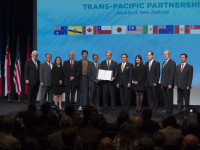The Canadian government has launched a public consultation on expanding the Comprehensive and Progressive Agreement for Trans-Pacific Partnership (CPTPP, formerly TPP) to other countries, specifically citing the UK, Taiwan, South Korea, and Thailand. The consultation could raise significant concerns as the UK would be the first non-Pacific country in the agreement and Taiwan could spark a response from China. Moreover, opening the agreement to new countries must likely factor in the possibility that the U.S. might want to re-enter the agreement if there is a change in administration in 2020.

Cooperation in the Pacific Rim by Jakob Polacsek, World Economic Forum (CC BY-NC-SA 2.0) https://www.flickr.com/photos/worldeconomicforum/48179628441
Digital Trade
The LawBytes Podcast, Episode 15: Cows, Cars, and Copyright – A Conversation With Myra Tawfik on the IP Concerns With Implementing the USMCA
The new NAFTA – dubbed the USMCA or CUSMA depending on where you live – took a significant step forward recently with the introduction of Canadian legislation designed to ratify the treaty. The economic implications of the agreement are enormous, particularly with respect to digital issues and intellectual property. Myra Tawfik, a law professor at the University of Windsor and Senior Fellow with CIGI, joins the podcast this week to discuss Canada’s longstanding history of facing external pressure on copyright, the role that trade negotiations now play with that pressure, and the implications of the USMCA.
Canadian Privacy Commissioner Signals Major Shift in Approach on Cross-Border Data Transfers
The Office of the Privacy Commissioner of Canada has released a consultation paper that signals a major shift in its position on data transfers, indicating that it now believes that cross-border disclosures of personal information require prior consent. The approach is a significant reversal of longstanding policy that relied upon the accountability principle to ensure that organizations transferring personal information to third parties are ultimately responsible for safeguarding that information. In fact, OPC guidelines from January 2009 explicitly stated that “assuming the information is being used for the purpose it was originally collected, additional consent for the transfer is not required.”
How Canada Surrendered Policy Flexibility for Data Localization Rules in the USMCA
The digital policy implications of the USMCA have attracted increasing attention as Canadians consider the risks that the agreement could limit future policy flexibility. In particular, the agreement restricts the use of data localization, an increasingly popular legal method for addressing public interest concerns associated with the collection of online information by mandating that data be stored within the local jurisdiction. Restrictions on data localization are not entirely new to Canada, since similar provisions are found in the CPTPP (the successor to the Trans Pacific Partnership). That means that Canada has already agreed to limits on data localization with or without the USMCA. However, the USMCA’s data localization provision differs in a significant way, suggesting that the Canadian government has agreed to an even more restrictive approach than that found in the CPTPP.
Setting the Standard?: How the USMCA Quietly Reshapes Global Digital Trade Agreements
The United States-Mexico-Canada Agreement (USMCA) is more than just an updated version of the North American Free Trade Agreement. With the inclusion of a digital trade chapter, the deal sets a new standard for e-commerce that seems likely to proliferate in similar agreements around the world. My Washington Post op-ed notes that negotiators have touted the benefits of addressing modern forms of commerce, but the reality is that the USMCA digital trade chapter raises many concerns, locking in rules that will hamstring online policies for decades by restricting privacy safeguards and hampering efforts to establish new regulation in the digital environment.











